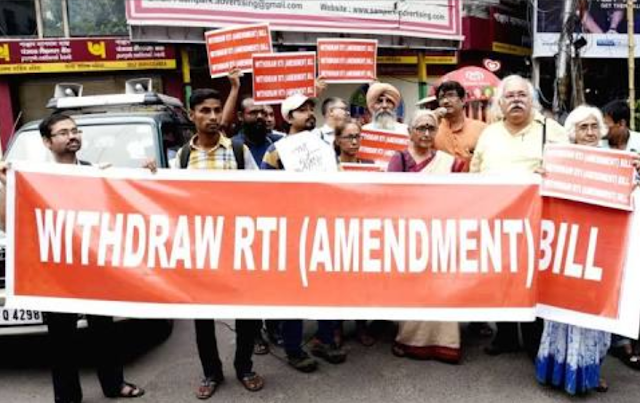
In 2019, regressive amendments were made to the Right to Information (RTI) Act to empower the Central government to prescribe through rules, the tenure, salaries and other terms and conditions of service of information commissioners across the country.
The amendment, and the subsequent rules promulgated by the government in October 2019, destroy the insulation provided to information commissions in the original Act to enable them to function independently.
The RTI Amendment Act and the subsequent rules were made in a completely surreptitious manner with no public consultation. This constituted a violation of the procedures laid down in the Pre-Legislative Consultation Policy of 2014.
An application under the RTI Act was filed on October 28, 2019 seeking a copy of all the correspondence, notings and comments of ministries, department and information commissions on the draft of the RTI Amendment Bill. The Department of Personnel and Training (DOPT) facilitated an inspection of the said file and on 16.1.2020 uploaded the file on their website. The RTI application and reply can be accessed here.
The files uploaded by the DOPT can be accessed on their website by following the RTI link and then the page Important files of IR Division.
A perusal of the files points to the following key issues
Cabinet directed that provisions on tenure of information commissioners be amended to allow it to be prescribed through rules by the government
The initial proposal only sought to amend the sections related to salaries and allowances payable to and other terms and conditions of service of information commissioners. There was no mention of amending the provisions related to tenure of information commissioners.
However, the cabinet directed that the provisions regarding the tenure of information commissioners should also be amended to allow the Central government to prescribe it through rules. Noting dated 5.7.2019 notes:
“Cabinet Note was sent for approval of Cabinet on 03.04.20 18. Cabinet Secretariat had conveyed the approval of the Cabinet vide DO letter No 13/CM/2018 dated 5/4/2018 (page 274/Corr). The Cabinet further directed that the term of office of Chief Information Commissioner, Information Commissioners, State Chief Information Commissioners and State Information Commissioners be as prescribed by the Central Government.”
Government sought relaxation of the rules of Lok Sabha and Rajya Sabha requiring prior notice and circulation of bill
The rules of procedure of Lok Sabha and Rajya Sabha require prior notice to be given for introducing a bill and also have provisions requiring circulation of bills to members before it is introduced.
Dr Jitendra Singh, Minister of State (MoS), Ministry of Personnel, Public Grievances & Pensions, wrote to the Speaker of the Lok Sabha and the Chairman of the Rajya Sabha seeking relaxation of these provisions.
Rule 123 of the Rules of Procedure and Conduct of Business in the Rajya Sabha states:
“123. Motion for consideration On the day on which the motion for consideration is set down in the list of business which shall, unless the Chairman otherwise directs, be not less than two days from the receipt of the notice, the member giving notice may move that the Bill be taken into consideration.”
Direction 19A,/19B of the Direction of the Speaker of the Lok Sabha state:
“19A. (1) A Minister desiring to move for leave to introduce a Bill shall give in writing the notice of one’s intention to do so.
"(2) The period of notice of a motion for leave to introduce a Bill under this direction shall be seven days unless the Speaker allows the motion to be made at shorter notice.
19B. No Bill shall be included for introduction in the list of business for a day until after copies thereof have been made available for the use of members for at least two days before the day on which the Bill is proposed to be introduced:
"…Provided further that in other cases, where the Minister desires that the Bill may be introduced earlier than two days after the circulation of copies or even without prior circulation, the Minister shall give full reasons in a memorandum for the consideration of the Speaker explaining as to why the Bill is sought to be introduced without making available to members copies thereof in advance, and if the Speaker gives permission, the Bill shall be included in the list of business for the day on which the Bill is proposed to be introduced.”
Government wrote to the Speaker of the Lok Sabha and Chairman of the Rajya Sabha requesting that the RTI Amendment Bill not be referred to a Parliamentary Standing Committee for detailed deliberations
Dr Jitendra Singh, MoS, Ministry of Personnel, Public Grievances & Pensions wrote to the Speaker of the Lok Sabha and the Chairman of the Rajya Sabha requesting that the Right to Information (Amendment) Bill, 2019 not be referred to a Department-related Parliamentary Standing Committee.




